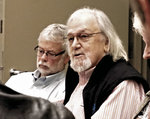Tom Thiersch has won a $18,000 judgment for having been vigilant in 2015 and catching the Jefferson County Public Utility District and Commissioner Wayne King acting in violation of the state Open …
This item is available in full to subscribers.
We have recently launched a new and improved website. To continue reading, you will need to either log into your subscriber account, or purchase a new subscription.
If you had an active account on our previous website, then you have an account here. Simply reset your password to regain access to your account.
If you did not have an account on our previous website, but are a current print subscriber, click here to set up your website account.
Otherwise, click here to view your options for subscribing.
* Having trouble? Call our circulation department at 360-385-2900, or email our support.
Please log in to continue |
|


Tom Thiersch has won a $18,000 judgment for having been vigilant in 2015 and catching the Jefferson County Public Utility District and Commissioner Wayne King acting in violation of the state Open Public Meetings Act (OPMA).
Jefferson County Superior Court Judge Keith Harper signed a judgment order Feb. 27 in which the PUD and Wayne King agree to pay Thiersch $4,000 for violating RCW 42.30.120(1). That law states that each member of a governing body who attends a meeting with knowledge that the meeting is in violation of the law should be exacted a civil penalty. The PUD and King did not contest the order.
In addition to the $4,000 fine, there is $14,000 that the PUD and King are to pay for attorney fees.
King, PUD District 3 commissioner from Gardiner, could not be reached for comment. PUD attorney Rick Hughes of Olympia referred comment to Mark R. Johnsen, who represents the PUD’s insurance company, the Public Utility Risk Management Service (PURMS). That agency represents 19 public utilities in Washington.
Johnsen said PURMS would write the check, not King, and declined further comment.
WHO PAYS?
Thiersch, a Jefferson County resident and member of the Washington Coalition for Open Government, said he doesn’t think ratepayers should have to pay for King’s mistake.
“I would prefer he pay everything the law requires, which is the $4,000 fine. The law requires it to be a personal liability of a civil penalty,” said Thiersch. “Why should the public agency pay for it?”
Thiersch said he’s thinking of asking PUD commissioners to require King to pay it, although he’s not sure when or in what venue.
PUD General Manager Jim Parker said that, technically, the PUD must pay a deductible, which he estimated to be $250.
The $4,000 was less than what Thiersch said the PUD originally offered him in an out-of-court settlement. He said it originally offered $2,000 more, but that he turned it down.
“It’s not about the money,” Thiersch said. “It’s about holding public officials accountable for their actions.”
Thiersch said, that after paying his attorney, Michele Earl-Hubbard, he plans to make contributions to the Washington Coalition for Open Government and the American Civil Liberties Union. He’ll keep a portion as well, but declined to say how much.
“These fines are tiny and inconsequential. They haven’t kept up with inflation,” he said. “But I am serious about officials violating their oaths of office. They can’t pick and choose what laws they want to obey.”
POSSIBLY HISTORIC
Thiersch said attorney Earl-Hubbard, who could not be reached by press time for comment, believes that it could be the first time the state’s open meetings law – enacted in 1971 – has resulted in an elected official being fined for knowingly violating the law.
“As far as we can tell, this case is the first to prove that an individual elected official in this state violated our OPMA ‘with knowledge of the fact.’ Wayne King knew that what he was doing was illegal, but he did it anyway, and on numerous occasions.”
PUD Commissioner Ken Collins and Barney Burke, a former commissioner, were not named in the suit, only King.
Paul Sullivan, a legal consultant for the Municipal Research and Services Center (MRSC), which offers advice to government agencies, said March 3 that he looked through cases and couldn’t find any decisions that noted any fines of individuals, though that didn’t mean there weren’t any. Therefore, he concluded that he couldn’t prove or disprove Thiersch’s statement.
EMAIL RECORDS
Thiersch used records obtained by public records requests, including emails between himself and King, to prove that King had attended training on the OPMA and that King knowingly violated the law pertaining to when, and for what reason, a board can convene in closed executive sessions.
On March 3, 2015, according to court records, Thiersch sent an email to all three commissioners and manager Parker. He attached a document from the MRSC that addresses the need to be specific when a board recesses into an executive session. Thiersch urged the board to follow the law for future meetings.
Later that same day, King responded, “Thanks for your opinion.”
That response, suggesting the law is an opinion, did not go over well with Thiersch.
“That really sort of said to me that this guy doesn’t care. You can put it in his face and he just doesn’t care that he’s breaking the law. That, to me, is unacceptable,” Thiersch said.
The $4,000 fine was calculated based on the number of violations, Thiersch said. Thiersch alleged 38 violations in his complaint. In 2015, when the violations occurred, the OPMA law had a $100-per violation-fine clause. In 2016, the law was changed and the per-violation fine rose to $500. Because of the timing of change, the $100 per violation was used to calculate the fine, Thiersch said.
There is another rule, CR 68, that also was applied.
A CR 68 “offer of judgment,” as it is called, is allowed in Washington’s superior courts in civil cases and allows one party to offer to settle a case. If the person bringing the suit agrees, the case doesn’t go to trial.
“They say, ‘Hey, look, we’re going to make you an offer and you won’t do any better in court, and if you don’t do any better in court, then you’re responsible for our costs,’” Thiersch said. “Because the $4,000 civil penalty in the offer of judgment was for more than the court would or could award at trial ($3,800), I had no choice to accept the offer,” Thiersch said.
“As far as Michele [Earl-Hubbard] knows, CR 68 has not previously been used in OPMA cases, mostly because it has been nearly impossible in prior cases to prove beyond any doubt that the individual who violated the act did so ‘with knowledge of the fact’ that they were doing so,” Thiersch wrote.
“In this case, the evidence was incontrovertible.”
VIGILANCE
Thiersch, who also attends meetings of the Jefferson Healthcare board, Jefferson County government as well as meetings of the City of Port Townsend, said he intends to stay vigilant.
“I’ve been attending every PUD meeting and I intend to keep on attending meetings,” Thiersch said. He said that now that the meetings are taped, he can listen in and monitor that way.
“I’m going to continue to monitor all of the large public agencies in Jefferson County,” he said.
Thiersch noted one last detail of the PURMS check: It was dated Feb. 24, three days before Harper signed the order on Feb. 27.